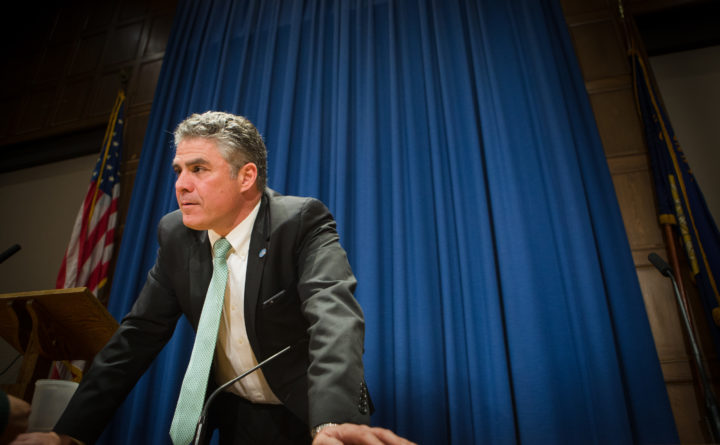
Good morning from Augusta. Proposals to allow Maine cities and towns to enshrine local-option sales taxes have momentum in 2019, but they’re facing the same problems that have stopped them in the past amid opposition from business groups and some progressives.
Gov. Janet Mills’ two-year budget proposal has pushed the Maine Municipal Association to list local-option taxes as a top priority for this legislative session by not proposing to fund revenue sharing to cities and towns at 5 percent, a threshold that has been shorted in the past decade.
However, it’s going to likely take the Mills administration’s buy-in if the new taxes are going to be allowed. The governor’s tax expert cited several of the same concerns at a legislative hearing on Wednesday that he did while working for former Gov. Paul LePage.
Cities and towns want the taxes as a way to diversify revenue and as a matter of local control, but the biggest ones would reap most of the benefit. Portland Mayor Ethan Strimling, a Democrat, and Auburn Mayor Jason Levesque, a Republican, headlined a news conference ahead of the hearing in support of the taxes. They came at it from slightly different vantage points. Strimling highlighted the challenges that service-center communities face and Levesque touted the issue of local control.
There are several local tax proposals before the Legislature this year. The Maine Municipal Association has called for an optional sales tax of not more than 1 percent and prefers proposals from Reps. Pinny Beebe-Center, D-Rockland, and Rep. Lori Gramlich, D-Old Orchard Beach, that would give cities and towns wide authority to use the money generated.
In Auburn, City Manager Peter Crichton testified a 1 percent tax would generate $7.6 million for the city and that he would recommend putting $2 million of it into direct property tax relief. Portland would get $16.8 million while Bangor would get $13.7 million under that regime.
Any new tax faces opposition, with opponents of these proposals citing the regressive nature of the sales tax and impacts on tourism.Many of the groups who have opposed local-option taxes were back on Wednesday, including the Maine State Chamber of Commerce, Hospitality Maine, a lobbying group for restaurants and hotels, the conservative Maine Heritage Policy and the liberal Maine Center for Economic Policy.
The latter group is hardly ever in agreement with conservatives who generally oppose tax increases, but many of these groups argued that increasing revenue sharing was a better way to increase funding to cities and towns than the regressive sales tax.
Michael Allen, the Mills administration’s associate commissioner for tax policy, cited potential conflicts with the Maine Constitution’s provision that the Legislature can’t surrender the power to tax and the U.S. Constitution after the Supreme Court noted in a 2018 decision in Wayfair v. South Dakota that said states should have a simple tax system for online retailers.
He made similar arguments in 2017 while working for LePage, a Republican. It’s unclear if enough has changed to give the cities and towns who want local-option taxes enough of a legislative push to do so.
Today in A-town
Making Maine energy independent and curbing greenhouse gas emissions will be a heavy focus for legislative committees today. The House and Senate will also reconvene this morning for their last sessions before the weekend.
— The Environment and Natural Resources Committee is scheduled to vote today on a bill that could delay permitting for the controversial Central Maine Power proposal. Committee members will consider LD 640, from Sen. Brownie Carson, D-Harpswell, which would task the state Department of Environmental Protection with reviewing the anticipated net effect on carbon emissions from the proposed $1 billion Central Maine Power-led proposal to send Hydro-Quebec power to Massachusetts.
The committee will consider three additional bills, including LD 797 and LD 818 which seek to curb greenhouse gas emissions across Maine, and LD 893which would enact an updated statewide Climate Action Plan. Listen here.
— The Committee on Energy, Utilities and Technology could also vote this afternoon on several bills that include developing a statewide energy plan that guides Maine toward fossil fuel-free and energy independent future. Listen here.
— The Committee on Agriculture, Conservation and Forestry will consider a few food-regulation bills that include requiring certain retail food locations to display ingredient lists, two bills to incentivize and support the purchase of local produce, and one that sets parameters around the raising and selling of whole rabbits for consumption. Listen here.
Reading list
— During the final months of his tenure, Maine’s former governor quietly had the state police create a motorcycle unit. Without legislative approval and using $171,000 in existing funds, LePage had the Maine State Police buy six motorcycles toward the end of 2018, along with necessary gear for an honor guard, which will largely be used part time for ceremonial purposes and to promote recruitment. The unit is scheduled to debut at a police academy graduation ceremony on April 12. It is not slated for any patrol work and it didn’t require dedicated funding in Mills’ budget proposal.
— The list of people pardoned by the former governor includes the grandson of a man who helped him when he was a child and 111 others. The Associated Press reports that one of LePage’s last acts as governor was to pardon the grandson of the late Bruce Myrick, who mentored and sheltered a young LePage when he ran away from home to escape abuse. On Dec. 31, LePage pardoned Myrick’s grandson, Jeremy Mills, for operating under the influence and driving while his license was suspended or revoked. Click here for the full list. In addition to the pardons, LePage shortened the sentences of 21 inmates in 2017 and one in 2018. Former Democratic Gov.John Baldacci issued 218 pardons to 141 people, while former independent Gov. Angus King, now a U.S. senator, issued 154 pardons to 100 people.
— A legislative hearing on a bill that would expand access to abortion in Maine drew dozens of people with strong feelings on the divisive topic. The bill, sponsored by Rep. Jay McCreight, D-Harpswell, and co-sponsored by roughly 80 other Democrats and independents, seeks to equalize access to abortion care for low-income and eligible MaineCare recipients by the mandating that the state Department of Health and Human Services cover the cost of those services. Additionally, any insurance carriers in Maine not already including coverage for those services must do so under their pre-existing maternity health care plans. During Wednesday’s public hearingon the bill, which stretched more than five hours, proponents and opponents made impassioned arguments, most of which were variations on the decades-old debate over using public funds for abortion.
— The governor signed a fast-tracked bill to clarify that production and sale of hemp-derived food products are allowable in the state.Rep. Craig Hickman, D-Winthrop, introduced the bill earlier this year after guidance from state regulators to retailers to stop sales of food products containing the hemp derivative cannabidiol, or CBD. The bill aligns the definition of hemp in state law with the definition included in the most recent federal Farm Bill, which makes clear hemp is not marijuana. Mills signed the bill on Wednesday. As an emergency measure, the new law takes effect immediately.
The best day of every year
For some of us, it’s a day of worship. Annie Savoy, a character in “Bull Durham,” explains it best:
“I believe in the Church of Baseball. I’ve tried all the major religions, and most of the minor ones. I’ve worshipped Buddha, Allah, Brahma, Vishnu, Siva, trees, mushrooms, and Isadora Duncan. I know things. For instance, there are 108 beads in a Catholic rosary and there are 108 stitches in a baseball… I’ve tried ’em all, I really have, and the only church that truly feeds the soul, day in, day out, is the Church of Baseball.”
To tide you over until the first pitch, here is some special Opening Day trivia for you:
— Bob Feller of the Cleveland Indians is the only pitcher to throw a no-hitter on Opening Day.
— Madison Bumgarner of the San Francisco Giants is the only pitcher to throw the last pitch of one year’s World Series and his team’s first pitch of the next season. Chris Sale of the Boston Red Sox could become the second one to do so later today.
— Seven existing franchises have never won the World Series. They are the Seattle Mariners, San Diego Padres, Colorado Rockies, Milwaukee Brewers, Texas Rangers, Washington Nationals and Tampa Bay Rays.
— The Giants have won the most World Series — three — in the decade that will end this year. The Red Sox could tie them if they repeat this year.
— If the New York Yankees do not win the World Series this year, it will be the first decade since the 1980s that the franchise has not won a World Series. Other than the 1980s, the Yankees have won at least one World Series in every decade dating to the 1920s. No pressure. #FadingFranchise #PatheticPinstripes.
— Even if the Yankees win the World Series in 2019, the best that defrocked dynasty can hope for is half as many titles this decade as the Red Sox. The Red Sox have won four times as many World Series titles as the Yankees during the current millennium. [2000 was the previous millennium]. Here is your soundtrack. — Robert Long
This article originally appeared on www.bangordailynews.com.




